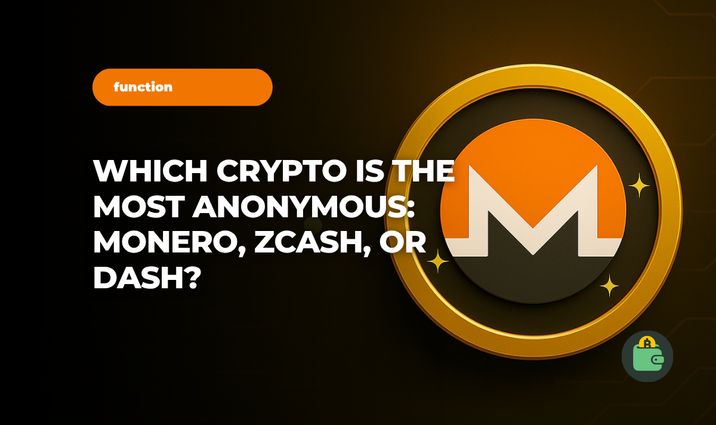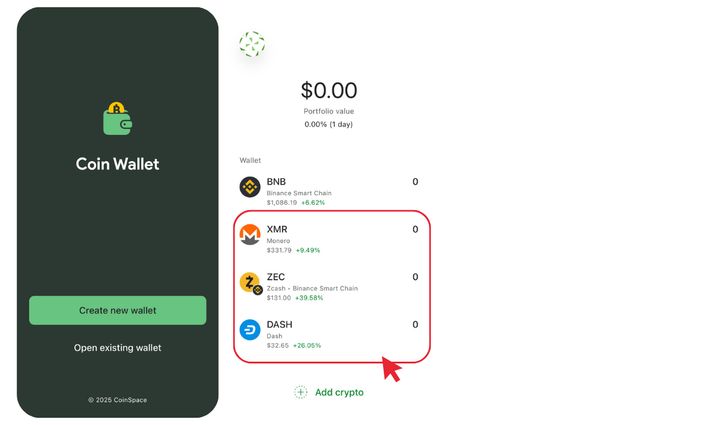Best Anonymous Cryptocurrency in 2025: Monero, Zcash, or Dash?

Bitcoin and Ethereum are considered decentralized, but their blockchains are completely transparent — anyone can see where the money came from and where it went. For those who value privacy, special “privacy coins” were created. Among them, Monero, Zcash, and Dash stand out the most. Let’s explore how they work, how they hide transactions, and what real benefits they bring to everyday users.
Key Takeaways
- Monero offers the strongest privacy by default, but transactions are slower and liquidity is limited due to exchange restrictions.
- Zcash provides flexibility, letting users choose between transparent and shielded transactions, though privacy isn’t enabled automatically.
- Dash focuses on speed and low fees, with optional privacy, making it more practical for everyday payments but less secure for full anonymity.
Why Use Privacy Coins?
Privacy means protecting your personal information and keeping your funds safe. If no one can see your balance, it’s harder for hackers to target you. If your transactions can’t be tracked, you stay in full control of your money without risking censorship or account freezes.
Privacy coins are also fungible. Unlike Bitcoin, where the “history” of a coin can make it problematic for exchange, Monero and Zcash don’t have this issue. Every XMR or ZEC is worth the same, which makes them similar to physical cash.
Monero (XMR): Privacy by Default
Monero is often called the “gold standard” of anonymity. Its main feature is that every transaction is private by default. In Bitcoin, every transfer can be traced, but with Monero, it’s impossible to know who sent money, who received it, or the amount.
This invisibility is achieved with several tools. Ring signatures mix your transaction with others, making it impossible to identify the true sender. Stealth addresses generate a unique one-time address for each transaction, hiding the real recipient. Transaction amounts are encrypted using RingCT and Bulletproofs, so even with full blockchain access, no one can see how much was sent.
Read more: Monero Wallets Sync Methods: Full Sync, Remote Node, and No-Sync
For users, this means complete financial privacy. Imagine running a business and accepting XMR payments: competitors won’t see your earnings, and outsiders won’t be able to link transactions to your wallet. In countries with strict censorship, Monero can even be the only way to stay financially free and secure.
Drawbacks of Monero. Such strong privacy comes at a cost. Monero transactions are slower than most other coins, and the blockchain is much heavier. On top of that, many exchanges have delisted XMR, so buying or selling it can be harder than trading Bitcoin.
Read more:
- Tired of Slow Sync? How to Choose a Monero Wallet That’s Actually Fast
- Why does it take Monero so long to sync?
Zcash (ZEC): Flexibility and Choice of Privacy
If Monero means privacy without options, Zcash is built around choice. It lets you make either transparent transactions or fully shielded ones. The key is zk-SNARKs — zero-knowledge proofs that confirm a transaction is valid without revealing details like addresses or amounts.
This duality makes Zcash convenient. A user can make transparent transfers when working with exchanges or when transparency is required but easily switch to shielded mode when privacy is needed. This is especially useful for companies or charities: sometimes they want to show where funds came from, and other times they prefer to protect donor privacy.
The flexibility of Zcash makes it a strong tool for those who want to balance privacy with compatibility in the financial system.
Drawbacks of Zcash. By default, ZEC transactions are transparent. Privacy is available, but only if you actively choose it. In practice, many users don’t enable shielded mode, so most transactions remain public. Shielded transfers also require more computing power and can have higher fees.
Dash (DASH): Speed and Optional Privacy
Dash was originally designed as “digital cash,” and its strongest features are speed and very low fees. Its architecture uses masternodes, which process transactions and allow the PrivateSend option. PrivateSend is based on CoinJoin: it combines coins from several users into one transaction and then redistributes them, making it much harder to trace the original source.
Unlike Monero or Zcash, privacy in Dash is optional. If you don’t enable PrivateSend, transactions remain transparent, but they are processed in just a few seconds. That’s why Dash is often used for everyday payments, like buying coffee or paying for subscriptions. Dash is more about balancing convenience and privacy, rather than offering total protection.
Drawbacks of Dash. Privacy is secondary in Dash. PrivateSend is just an option, and most transactions stay public. Also, CoinJoin doesn’t guarantee complete anonymity — with advanced blockchain analysis, some links between addresses can still be uncovered.
Risks and Limitations of Privacy Coins
Privacy coins aren’t without challenges.
-
Regulatory pressure. In 2021, Bittrex delisted Monero, Zcash, and Dash. Later, Kraken announced it would stop supporting Monero in the UK. In Japan and South Korea, regulators have outright banned privacy coins.
-
Exchange restrictions. Because of regulations, exchanges are forced to limit XMR, ZEC, and DASH trading. This makes it harder to buy them directly.
-
No perfect anonymity. While Monero, Zcash, and Dash hide transactions, blockchain analysts constantly develop tools to break through their privacy layers. Researchers sometimes find vulnerabilities in older protocols that allow partial tracing.
-
User responsibility. Losing your private key means losing your funds forever. There is no bank or support desk to recover access.
Why Coin Wallet Is Convenient for Privacy Coins
To make using privacy coins both safe and easy, you need the right tool. Coin Wallet is one of the best options. Here’s why:
- Supports Monero, Zcash, and Dash — all major privacy coins in one app.
- Full control — private keys are stored only on your device, encrypted, and never sent to servers.
- Buy and sell in one click — purchase XMR or DASH with a bank card or Apple/Google Pay starting from just $30.
- Instant transfers — fast transactions with minimal fees.
- Extra protection — two-factor authentication, hardware wallet support, and even Tor integration.
- Beginner-friendly — clean interface, sync between mobile and desktop, and 24/7 support.

Coin Wallet combines convenience with security, making privacy coins accessible for both beginners and advanced users.
The Bottom Line
Monero remains the benchmark of privacy, though it sacrifices speed and liquidity. Zcash offers flexibility, but its transactions are transparent by default. Dash stands out for speed and convenience, but privacy is only optional.
Each of these coins has its own role, and together they form a powerful toolkit for protecting your personal finances. With Coin Wallet, you can easily store, buy, and transfer XMR, ZEC, and DASH while keeping the right balance between privacy and usability.
Join the Coin Wallet community, where decentralization, security, and freedom of choice are at the heart of everything we do ❤️